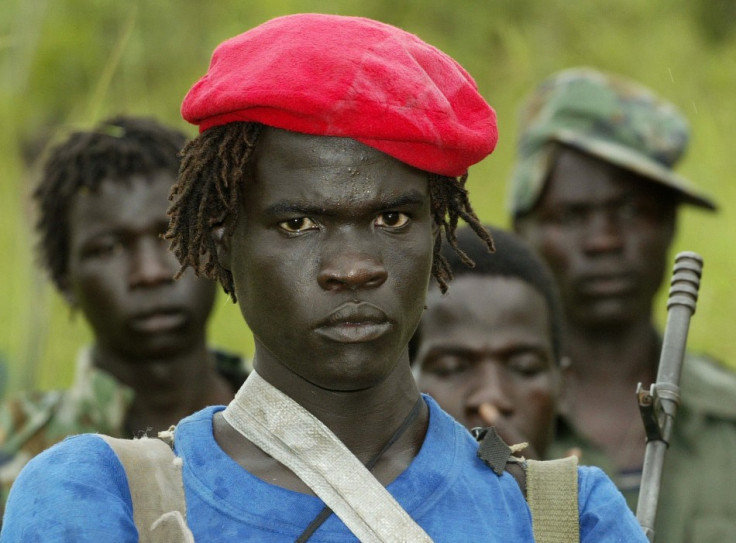Invisible Children's Kony 2012 Campaign an Ode to Pax-Americana?

The Kony 2012 film by the NGO Invisible Children has created a huge buzz and divided opinion on the internet.
Jason Russell, who founded the organisation, starts the film with the birth of his son, Gavin, in the secure environment of a US hospital. "He did not choose when or where he was born," Russell says in his narration.
While the first few minutes of footage show the, apparently, ideal life Gavin was born into, things take a turn for the worse as soon as the word Africa is mentioned.
For decades, Africans, academic, writers, journalists and activists have denounced and criticised the repeated portrayal of the continent as that of a dependant child and in need of protection from the "more civilised, adult" Western world.
As Kony 2012 shows, however, the concept remains popular, as the film has now been viewed more than 49 million times.
Russell then moves on to introduce his "African friend", Jacob Acaye, a former child soldier who was abducted from the Lord's Resistance Army (LRA), along with his brother. Jacob escaped but his brother was killed and the survivor is still haunted by the memories of the atrocities he witnessed.
"I made him a promise," Russell says: "We are going to do everything that we can to stop them. Do you hear my words?" he asks Jacob.
It is difficult to grasp who Russel is referring to when he employs the term "we", as his message and the way in which it is articulated throughout the film appear destined for a predominantly Western audience.
The film also follows US president Barack Obama's well-publicised effort to help fight the LRA by sending 100 Americans marines to Uganda in an attempt to help America's African brothers.
Invisible Children claims the intention of the film and the campaign that has accompanied it is to push for Joseph Kony to be arrested by the International Criminal Court.
With the best of intentions, it remains unclear how the organisation expects the local communities most affected by the militia's attacks in South Sudan, the Central African Republic (CAR) , the Democratic Republic of Congo (DRC) and northern Uganda to possibly access or connect with the film.
Internet service in most of the remote regions of these countries, where the LRA is hiding and operates, is a luxury that remains out of reach of many.
Another obstacle is the oversimplified version of the situation that Russell presents in his portrayal.
The film focuses on Uganda without including South Sudan, CAR or DRC - areas in which the LRA has been most active over the past five to six years.
It also fails to provide a clear explanation of the group's origins or why its ideology, based on the Ten Commandments, struck a chord with those who took up arms to fight for Kony.
"The LRA initially came from Uganda with the aim of overthrowing the Ugandan government. The militia was founded by a woman named Alice Lakwena and was called the Holy Spirit Movement," Lt Felix Basset, military spokesperson for the UN Stabilisation Mission in the Democratic Republic of Congo, told International Business Times UK.
"The armed group revolved around Lakwena and she claimed the Holy Spirit communicated with her. After a failed coup against Ugandan president Yoweri Museveni in 1987, Kony took over the movement basing his rule on a similar cult of personality," Basset said.
"He renamed the group the Holy Spirit of the Mobile Force 2," he said, adding that the militia adopted LRA in 1989.
"The LRA is an extremely mobile and fluid group that is difficult to track down. It is split into numerous cells that act independently of one another. The cult of Kony remains dominant and its members continue to believe in his spiritual capacities," he warned.
The film and the debates it has sparked failed to satisfactorily account for the origins of the myths built around the LRA's leaders.
The propagation of religious and cultural beliefs that do not even have roots in African indigenous culture remains problematic throughout the continent.
Moreover, if the overthrow of the Ugandan government is still the LRA's goal, then why does it attack civilians in neighbouring countries? What motivates it?
No one seems to have a clear answer except, possibly, Ugandan journalist Angelo Opi-aiya Izama. She wrote on a blog: "While LRA is seen as a mindless evil force, its deceased deputy leader, Vincent Otii, told me once that their fight with President Yoweri Museveni was about 'money and oil'."
© Copyright IBTimes 2025. All rights reserved.





















